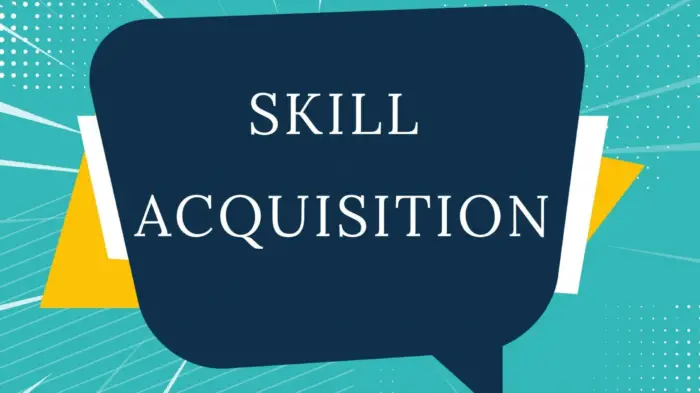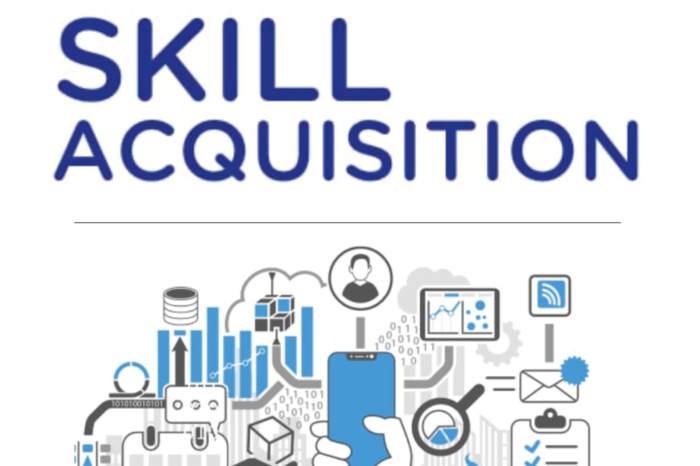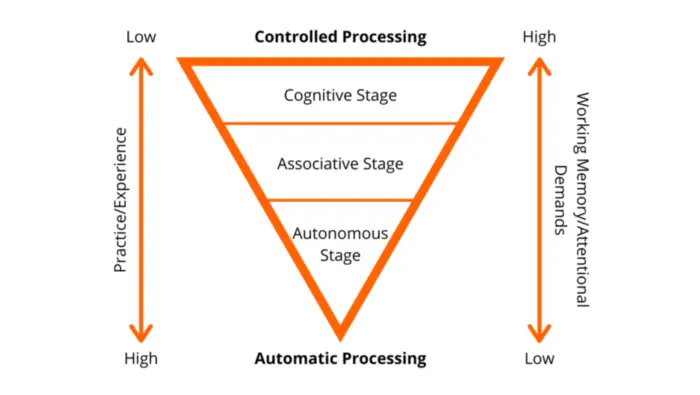Every person needs to acquire new skills to remain competitive. Learning new things can be a valuable tool for building your career or advancing your job, but learning a new skill or updating old ones can be challenging, especially if you feel like the process could be faster.
Skill acquisition refers to acquiring, developing, and improving specific skills or abilities through learning and practice. It involves acquiring cognitive and physical skills, ranging from essential motor to complex cognitive abilities. It encompasses the steps taken to learn and master a particular skill, starting from the initial stages of learning to the point where the skill becomes automated and can be performed effortlessly.
In this article, I’ll discuss what skill acquisition is, how it differs from other learning processes, why it’s essential, and the three stages of it.
Definition of skill acquisition
Skill acquisition refers to the process of developing a new skill or strengthening an existing one. It includes physical skills like playing the guitar and cognitive skills like learning to speak a new language.
As humans, we constantly strive for improvement, and learning new things can help us feel fulfilled in our daily lives.
See Also: 12 Most Amazing Facts about Digital Marketing
Why is skill acquisition important?
The process of developing skills in some way or another. This could mean gaining new abilities or further fostering the ones you now have. For example: learning a language by going to class four hours per week would be considered skill acquisition because the student was going to language class four hours a week, which helps them acquire their desired skill. When people think about skill development, they often think about it as something that happens when a person spends time working on something like studying for exams, but there are also many other ways it can happen.
Skill acquisition is the method of discovering a new skill.
” Acquisition ” means taking something you already have and adding it to your repertoire, while “learning” suggests adapting your existing knowledge base. In other words, acquiring skills means gaining new insights into how people can use their existing skills in different ways and contexts. Skill acquisition involves mental and physical processes; it also requires motivation from your environment (i.e., training opportunities) and from within yourself (i.e., intrinsic factors such as curiosity about something new).
What is the distinction between skill and skill acquisition?
To put it simply, skill acquisition refers to learning a new skill. A person acquires skills through various ways, such as observation, experience, and instruction. Another way to think about it is becoming skilled at something or learning how to do something. For example, if you’re considering getting into programming or knitting as a hobby, you are acquiring skills in these areas. Sometimes people develop skills by being present during an event requiring those skills. For example, if someone learns to be a babysitter while watching their friend’s kids one weekend, they can learn how to change diapers and feed babies without formal training. A common misconception is that all skills are learned equally, but this isn’t the case. When we learn certain types of information, our brain adapts differently than when we learn others.
The three stages of skill acquisition
Learning refers to the initial stage in which an individual gains new skills. The consolidation stage is when the person practices what they have learned until they become more proficient at it. The maintenance stage occurs when the individual applies their newly acquired skills to a more diverse range of environments to maintain them.
For example, a student may go through all three stages during the school year; first learning about a subject in class, then consolidating what they have learned by studying for exams or doing homework assignments at home, and finally applying that knowledge to other aspects of life outside of school like playing sports or doing arts & crafts. Skills are developed in these three stages. To take advantage of these opportunities early on and learn how to acquire skills as efficiently as possible, young people need some essential support from parents and educators who can help guide them on how to keep developing and strengthening their skills.
Stage 1: Cognitive Stage
The cognitive stage of skill acquisition begins when an individual recognizes the need for a new skill. The individual will then analyze the skills they already have. This is done in order to determine if the skill can be gotten through self-study or by someone else. If it’s impossible to learn independently, the individual may research whether it’s available as a class at their local community college. An activity plan is made and taken out when the choice has been made.
Stage 2: Associative Stage
In the second stage of skill acquisition, the learner begins associating what they’ve learned with other concepts they already know. They start to see connections between their new knowledge and things from other areas of their lives. This stage can be a little frustrating because it will often take many repetitions for learners to fully understand a concept before it makes sense to other concepts.
Learning to read music requires many repetitions of looking at notation on the page before you can associate what you see with the sounds in your head.
Stage 3: Autonomous Stage
The autonomous stage is when skills are fully earnt. This stage can take a long time because many obstacles are to be overcome. The most common obstacle is experiencing failure, which teaches how to adjust your strategy and tactics if things don’t work out. Another obstacle is the lack of feedback. Feedback comes from three different sources: intrinsic, extrinsic, and vicarious. Intrinsic feedback provides information about one’s actions by themselves or by other people. Extrinsic feedback comes from an external source like social media or television. Vicarious feedback involves observing someone else’s behavior or results without directly participating in those behaviors or having any control over them.
FAQs
Why is skill acquisition important to students?
Learning new skills will help you develop the career you want. Even if you are unsure what you want to do, taking classes in various subjects will give you experience and allow you to explore different interests. Remember that acquiring skills doesn't just have to be about schoolwork. You can also learn from your family or friends by working on projects together.
What is skill acquisition and development?
The term skill acquisition refers to acquiring skills for a specific task. It can be used as a verb (to acquire skills) or an adjective (a skillful craftsman). There are three stages to skill acquisition: 1) performance without awareness, 2) conscious competence, and 3) unconscious competence. It's vital that people develop new skills throughout their lives because it helps them keep up with changes in society and technology.
What are the features of skill acquisition?
1. The most common way of gaining abilities occurs in three phases: early, halfway, and late. 2. Beginning phase abilities are the easiest to advance yet the hardest to dominate. 3. Intermediate stage skills take more effort than early stage skills but do not require as much practice as late stage skills. 4. Late-stage skill acquisition requires the most work and practice but yields the best results overall.
How can I improve my knowledge and skills at work?
There are three stages of skill acquisition: exploration, consolidation, and application. Exploration occurs when you first start learning a new skill. Consolidation is the stage in which you work to master that skill. Application is when you use your skills in different ways. For instance, assume somebody needs to figure out how to cook vegetables. They might explore by trying several vegetables at home and discussing them with friends who cook. Next, they consolidate their cooking knowledge by making dishes for family members or practicing for an upcoming dinner party. Finally, they apply their skills by preparing a dish for an event or cooking alongside another chef.
Conclusion
What is skill acquisition? It’s the process of developing skills. Abilities are through training and experience. There are three cognitive, associative, and autonomous phases of ability securing. In the cognitive stage, you’re taking in information about a skill. In the associative stage, you’re practicing or learning how to perform the skill on your own but still receiving feedback from a teacher or coach.
Skill acquisition is vital because it helps us to be more effective in our jobs and lives. The more skills we have, the better prepared we will be for our future career paths. This article has given you an overview of what skill acquisition is, why it’s essential.
See also: What is a T-Shaped Marketer?




